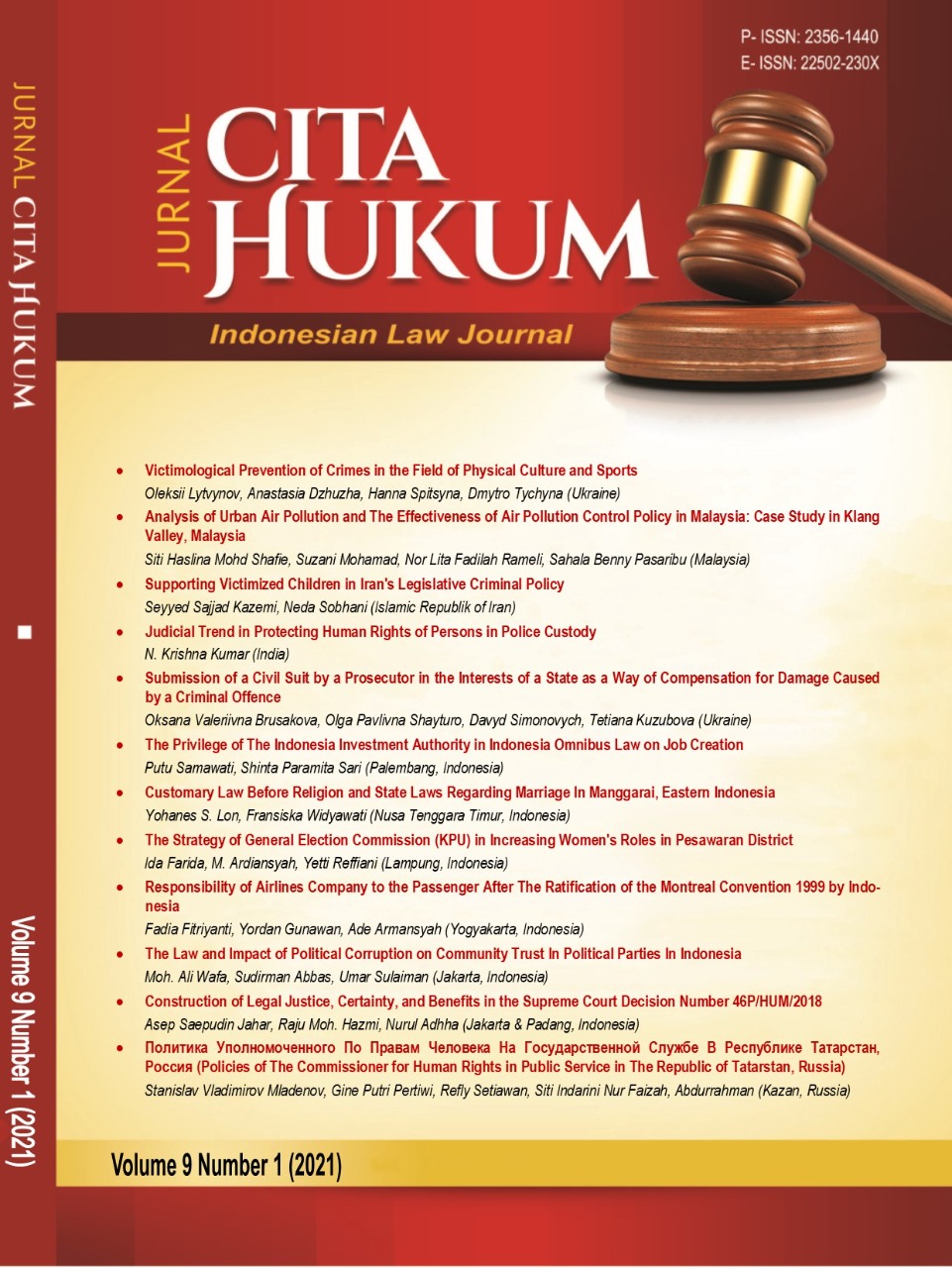Judicial Trend in Protecting Human Rights of Persons in Police Custody
DOI:
https://doi.org/10.15408/jch.v9i1.18299Keywords:
Arbitrary Arrest, Custodial Death, Judicial Review, Torture, VictimAbstract
A person is not liable to be arrested merely on the suspicion of complicity in an offence. The date and time of arrest shall be recorded in the memo which must also be countersigned by the arrestee. The right to counsel begins when a person is being interrogated and continues through pre-trial stages to trial and into appeal since it is an essential ingredient of the reasonable, fair, and just procedure. It would be prudent for the police officer to allow a lawyer where the accused wants to have one at the time of interrogation if he wants to escape the censure that the interrogation is carried on in secrecy by physical and psychic torture. However, these formalities are not followed in all cases and all countries. The higher police officials, even though they may privately be critical of the actions of the lower officials, are tending to protect their fellowmen or the government from civil liability.
Keywords: Arbitrary Arrest; Custodial Death; Judicial Review; Torture, Victim
Tren Peradilan dalam Melindungi Hak Asasi Manusia dalam Penahanan Polisi
Abstrak
Seseorang tidak bertanggung jawab untuk ditangkap hanya karena dicurigai terlibat dalam suatu pelanggaran. Tanggal dan waktu penangkapan harus dicatat dalam memo yang juga harus ditandatangani oleh orang yang ditangkap. Hak atas nasihat dimulai ketika seseorang diinterogasi dan berlanjut melalui tahap pra-peradilan hingga persidangan dan naik banding karena ini merupakan unsur penting dari prosedur yang masuk akal, adil, dan adil. Akan lebih bijaksana bagi petugas polisi untuk mengizinkan pengacara di mana terdakwa ingin memilikinya pada saat interogasi jika dia ingin menghindari kecaman bahwa interogasi dilakukan secara rahasia dengan penyiksaan fisik dan psikis. Namun, formalitas ini tidak diikuti di semua kasus dan semua negara. Pejabat polisi yang lebih tinggi, meskipun mereka secara pribadi mengkritik tindakan pejabat yang lebih rendah, cenderung melindungi sesamanya atau pemerintah dari pertanggungjawaban perdata.
Kata Kunci: Penangkapan Sewenang-wenang; Penahanan Mati; Peninjauan Kembali; Penyiksaan; Korban
Судебные Тенденции В Защите Прав Человека
При Содержании Под Стражей В Полиции
Аннотация
Никто не может быть арестован только по подозрению в причастности к преступлению. Дата и время ареста должны быть записаны в памятной записке, которая также должна быть подписана арестованным. Право на консультацию начинается с допроса человека и продолжается на досудебной стадии до суда и апелляции, поскольку это важный элемент разумной и справедливой процедуры. Было бы разумно, если бы полицейский допустил адвоката, которого обвиняемый хочет иметь во время допроса, если он хочет избежать критики в связи с тем, что допрос проводится тайно с применением физических и психологических пыток. Однако эта формальность соблюдается не во всех случаях и не во всех странах. Высокопоставленные полицейские, даже если они лично критиковали действия низших должностных лиц, как правило, защищали себя или правительство от гражданской ответственности.
Ключевые Слова: Необоснованный Арест; Смерть В Условиях Содержания Под Стражей; Судебный Пересмотр; Пытки, Жертва
References
Books
Allen, R.J. (1978). Effective Supervision in the Police Service. Mc Graw Hill Book Co. Ltd.
London.
Bajwa, G. S. (1995). Human rights in India: Implementation and Violation. Anmol Publications. New Delhi
Basu, D.D. (1994). Human Rights in Constitutional Law. Prentice Hallof India Pvt. Ltd. New
Delhi.
Chandrasekharan, Pillai. K.N. (1993). R.V. Kelker’s Criminal Procedure. Eastern Book Co. Lucknow.
Kirk, Paul, L. (1966). Crime Investigation - Physical Evidence and Police Laboratory. Interscience Publishers, Inc. Newyork.
Mays, John Barron. (1963). Crime and the Social Structure, Faber and Faber Ltd. London.
Menon, Madhava, N.R. (1997). A Training Manual for Police on Human Rights. National Law School of India University. Bangalore.
Ponnaian, M., Panch Ramalingam and Rani Ponnaian. (1999). Glimpses of Human Rights, P.R.Books. Delhi.
Rai, Rahul. (2000). Human Rights: UN Initiatives. Authors press.
Reckless, Walter, C. (1967). The Crime Problem. Appleton-Century-Crofts. Division of Meredith Publishing Company. Newyork.
Setunga, Philip, and Cheesman, Nick. (2001). Torture: A Crime against Humanity. Asian Human Rights Commission (AHRC). China.
Werthman, Carl, and Piliavin, Irving. (1967). Gang Members and the Police. Berkeley. The University of California.
Book chapter
Pappu, Shyamlha. (2000). Custodial crimes - An affront to human dignity. Ramaswamy, K (Ed.), Human Rights Year Book (pp. 114-199). Delhi, India: Universal Law Publishing Co. Ltd.
Journal article
Katju, Markandey, J. (2000). Torture as a Challenge to Civil Society and the Administration of Justice, S.C.C., Jl.39, 40-41.
Mathew, P.D. (1998). Police Investigation, Legal News and Views. Vol.12 No.6, 25.
International Documents
Methods of Combating Torture. (1987). Fact Sheet No.4. (p. 6). Geneva 10, Switzerland: U.N. Publications.
United Nations: Human Rights and Pre-trial Detention. (1994). A Handbook of International Standard Relating to Pre-trial Detention. (pp. 2-3). Geneva 10, Switzerland: U.N. Publications.












